| Listing 1 - 10 of 1434 | << page >> |
Sort by
|
Book
ISBN: 8804466367 Year: 2001 Publisher: Milano : Mondadori,
Abstract | Keywords | Export | Availability | Bookmark
 Loading...
Loading...Choose an application
- Reference Manager
- EndNote
- RefWorks (Direct export to RefWorks)
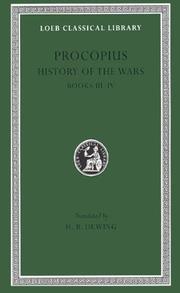
ISBN: 0674990900 Year: 2015 Publisher: United States : Harvard University Press,
Abstract | Keywords | Export | Availability | Bookmark
 Loading...
Loading...Choose an application
- Reference Manager
- EndNote
- RefWorks (Direct export to RefWorks)
Procopius of Caesarea was born in approximately 500. He is generally considered to be the last major historian of the ancient world. His works have given us a unique and intimate account both of the Roman Military and its Emperor Justinian. A native of Caesarea in Palaestina Prima little else is known of his early life, and apart from assuming that he would have received a classical Greek Education the rest is deduction rather than based on known facts. In 527, the first year of Eastern Roman Emperor Justinian I's reign, he became the adsessor (legal adviser) for Belisarius, Justinian's chief military commander who was then starting out on what would become a brilliant military career, initially in the East of the Empire. After early successes Belisarius was defeated in 531 at the Battle of Callinicum and recalled to the Empire's heart in Constantinople. Justinian was without doubt clever but cruel. When part of Constantinople rose against him in the Nika riots of January, 532, he sent Belisarius and his fellow general Mundo to repress them in a savage massacre in the Hippodrome - witnessed by Procopius. The following year Procopius accompanied Belisarius on his victorious expedition against the Vandal kingdom in North Africa and took part in the capture of Carthage. Procopius remained in Northern Africa with Belisarius' successor, Solomon the Eunuch, when Belisarius returned to Constantinople. Procopius rejoined Belisarius for his campaign against the Ostrogothic kingdom in Italy and was there for the Gothic siege of Rome that lasted a year and nine days and ended in March, 538. He witnessed Belisarius' entry into the Gothic capital, Ravenna, in 540. However at some point in the next few years Procopius seems to have been moved away from working with Belisarius. When the latter was sent back to Italy in 544 to cope with a further outbreak of the war with the Goths, Procopius appears to have no longer been with Belisarius' staff. Procopius continued to record history and his works are both insightful and clear headed, distilling the complexities of the times into several classic books. His death is thought to have been around 560.
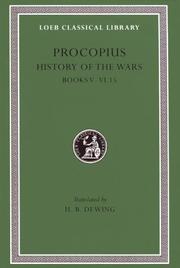
ISBN: 0674991192 Year: 2015 Publisher: United States : Harvard University Press,
Abstract | Keywords | Export | Availability | Bookmark
 Loading...
Loading...Choose an application
- Reference Manager
- EndNote
- RefWorks (Direct export to RefWorks)
Procopius of Caesarea was born in approximately 500. He is generally considered to be the last major historian of the ancient world. His works have given us a unique and intimate account both of the Roman Military and its Emperor Justinian. A native of Caesarea in Palaestina Prima little else is known of his early life, and apart from assuming that he would have received a classical Greek Education the rest is deduction rather than based on known facts. In 527, the first year of Eastern Roman Emperor Justinian I's reign, he became the adsessor (legal adviser) for Belisarius, Justinian's chief military commander who was then starting out on what would become a brilliant military career, initially in the East of the Empire. After early successes Belisarius was defeated in 531 at the Battle of Callinicum and recalled to the Empire's heart in Constantinople. Justinian was without doubt clever but cruel. When part of Constantinople rose against him in the Nika riots of January, 532, he sent Belisarius and his fellow general Mundo to repress them in a savage massacre in the Hippodrome - witnessed by Procopius. The following year Procopius accompanied Belisarius on his victorious expedition against the Vandal kingdom in North Africa and took part in the capture of Carthage. Procopius remained in Northern Africa with Belisarius' successor, Solomon the Eunuch, when Belisarius returned to Constantinople. Procopius rejoined Belisarius for his campaign against the Ostrogothic kingdom in Italy and was there for the Gothic siege of Rome that lasted a year and nine days and ended in March, 538. He witnessed Belisarius' entry into the Gothic capital, Ravenna, in 540. However at some point in the next few years Procopius seems to have been moved away from working with Belisarius. When the latter was sent back to Italy in 544 to cope with a further outbreak of the war with the Goths, Procopius appears to have no longer been with Belisarius' staff. Procopius continued to record history and his works are both insightful and clear headed, distilling the complexities of the times into several classic books. His death is thought to have been around 560.
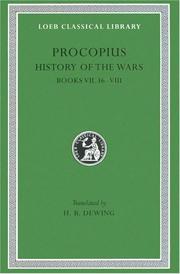
ISBN: 0674992393 Year: 2015 Publisher: United States : Harvard University Press,
Abstract | Keywords | Export | Availability | Bookmark
 Loading...
Loading...Choose an application
- Reference Manager
- EndNote
- RefWorks (Direct export to RefWorks)
Procopius of Caesarea was born in approximately 500. He is generally considered to be the last major historian of the ancient world. His works have given us a unique and intimate account both of the Roman Military and its Emperor Justinian. A native of Caesarea in Palaestina Prima little else is known of his early life, and apart from assuming that he would have received a classical Greek Education the rest is deduction rather than based on known facts. In 527, the first year of Eastern Roman Emperor Justinian I's reign, he became the adsessor (legal adviser) for Belisarius, Justinian's chief military commander who was then starting out on what would become a brilliant military career, initially in the East of the Empire. After early successes Belisarius was defeated in 531 at the Battle of Callinicum and recalled to the Empire's heart in Constantinople. Justinian was without doubt clever but cruel. When part of Constantinople rose against him in the Nika riots of January, 532, he sent Belisarius and his fellow general Mundo to repress them in a savage massacre in the Hippodrome - witnessed by Procopius. The following year Procopius accompanied Belisarius on his victorious expedition against the Vandal kingdom in North Africa and took part in the capture of Carthage. Procopius remained in Northern Africa with Belisarius' successor, Solomon the Eunuch, when Belisarius returned to Constantinople. Procopius rejoined Belisarius for his campaign against the Ostrogothic kingdom in Italy and was there for the Gothic siege of Rome that lasted a year and nine days and ended in March, 538. He witnessed Belisarius' entry into the Gothic capital, Ravenna, in 540. However at some point in the next few years Procopius seems to have been moved away from working with Belisarius. When the latter was sent back to Italy in 544 to cope with a further outbreak of the war with the Goths, Procopius appears to have no longer been with Belisarius' staff. Procopius continued to record history and his works are both insightful and clear headed, distilling the complexities of the times into several classic books. His death is thought to have been around 560.
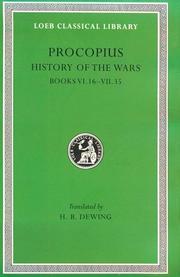
ISBN: 0674991915 0434991732 Year: 2015 Publisher: United States : Harvard University Press,
Abstract | Keywords | Export | Availability | Bookmark
 Loading...
Loading...Choose an application
- Reference Manager
- EndNote
- RefWorks (Direct export to RefWorks)
Procopius of Caesarea was born in approximately 500. He is generally considered to be the last major historian of the ancient world. His works have given us a unique and intimate account both of the Roman Military and its Emperor Justinian. A native of Caesarea in Palaestina Prima little else is known of his early life, and apart from assuming that he would have received a classical Greek Education the rest is deduction rather than based on known facts. In 527, the first year of Eastern Roman Emperor Justinian I's reign, he became the adsessor (legal adviser) for Belisarius, Justinian's chief military commander who was then starting out on what would become a brilliant military career, initially in the East of the Empire. After early successes Belisarius was defeated in 531 at the Battle of Callinicum and recalled to the Empire's heart in Constantinople. Justinian was without doubt clever but cruel. When part of Constantinople rose against him in the Nika riots of January, 532, he sent Belisarius and his fellow general Mundo to repress them in a savage massacre in the Hippodrome - witnessed by Procopius. The following year Procopius accompanied Belisarius on his victorious expedition against the Vandal kingdom in North Africa and took part in the capture of Carthage. Procopius remained in Northern Africa with Belisarius' successor, Solomon the Eunuch, when Belisarius returned to Constantinople. Procopius rejoined Belisarius for his campaign against the Ostrogothic kingdom in Italy and was there for the Gothic siege of Rome that lasted a year and nine days and ended in March, 538. He witnessed Belisarius' entry into the Gothic capital, Ravenna, in 540. However at some point in the next few years Procopius seems to have been moved away from working with Belisarius. When the latter was sent back to Italy in 544 to cope with a further outbreak of the war with the Goths, Procopius appears to have no longer been with Belisarius' staff. Procopius continued to record history and his works are both insightful and clear headed, distilling the complexities of the times into several classic books. His death is thought to have been around 560.
Book
ISBN: 9781472476968 1472476964 Year: 2016 Volume: 1059 Publisher: London : Routledge, Taylor & Francis Group,
Abstract | Keywords | Export | Availability | Bookmark
 Loading...
Loading...Choose an application
- Reference Manager
- EndNote
- RefWorks (Direct export to RefWorks)
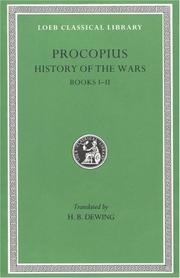
ISBN: 0674990544 9780674990548 Year: 2015 Publisher: United States : Harvard University Press,
Abstract | Keywords | Export | Availability | Bookmark
 Loading...
Loading...Choose an application
- Reference Manager
- EndNote
- RefWorks (Direct export to RefWorks)
Procopius of Caesarea was born in approximately 500. He is generally considered to be the last major historian of the ancient world. His works have given us a unique and intimate account both of the Roman Military and its Emperor Justinian. A native of Caesarea in Palaestina Prima little else is known of his early life, and apart from assuming that he would have received a classical Greek Education the rest is deduction rather than based on known facts. In 527, the first year of Eastern Roman Emperor Justinian I's reign, he became the adsessor (legal adviser) for Belisarius, Justinian's chief military commander who was then starting out on what would become a brilliant military career, initially in the East of the Empire. After early successes Belisarius was defeated in 531 at the Battle of Callinicum and recalled to the Empire's heart in Constantinople. Justinian was without doubt clever but cruel. When part of Constantinople rose against him in the Nika riots of January, 532, he sent Belisarius and his fellow general Mundo to repress them in a savage massacre in the Hippodrome - witnessed by Procopius. The following year Procopius accompanied Belisarius on his victorious expedition against the Vandal kingdom in North Africa and took part in the capture of Carthage. Procopius remained in Northern Africa with Belisarius' successor, Solomon the Eunuch, when Belisarius returned to Constantinople. Procopius rejoined Belisarius for his campaign against the Ostrogothic kingdom in Italy and was there for the Gothic siege of Rome that lasted a year and nine days and ended in March, 538. He witnessed Belisarius' entry into the Gothic capital, Ravenna, in 540. However at some point in the next few years Procopius seems to have been moved away from working with Belisarius. When the latter was sent back to Italy in 544 to cope with a further outbreak of the war with the Goths, Procopius appears to have no longer been with Belisarius' staff. Procopius continued to record history and his works are both insightful and clear headed, distilling the complexities of the times into several classic books. His death is thought to have been around 560.
Book
ISBN: 1282423916 9786612423918 0803226209 9780803226203 9780803274679 080327467X 9780803220355 0803220359 Year: 2009 Publisher: Lincoln University of Nebraska Press
Abstract | Keywords | Export | Availability | Bookmark
 Loading...
Loading...Choose an application
- Reference Manager
- EndNote
- RefWorks (Direct export to RefWorks)
Beset by enemies on every side and torn by internal divisions, the crusader kingdoms were a hotbed of intrigue, where your greatest ally might be your natural enemy. Because lives and kingdoms often rested on the edge of a sword blade, it was a time when a bold heart and a steady hand would see you far-so long as you watched your back.
Book
ISBN: 9782503588803 2503588808 Year: 2021 Publisher: Turnhout Brepols
Abstract | Keywords | Export | Availability | Bookmark
 Loading...
Loading...Choose an application
- Reference Manager
- EndNote
- RefWorks (Direct export to RefWorks)
This volume offers a comparative approach to the crusade movement on the frontiers of Latin Christendom in the High Middle Ages, bringing a regional focus to research on these peripheral phenomena. It features several key questions: Which military campaigns were propagated as crusades on the peripheries of the Christian West? What efforts were made to gain recognition for them as crusades and what effects did these have? What value did the crusade movement have for societies at the fines christianitatis? What role did the cruciatae have in strengthening pan-Western sense of togetherness and solidarity, and what role did they have for creation of a crusader and frontier identity? The nineteen papers, ranging in scope from the southern and eastern Baltic regions to Iberia, Egypt and the Balkans, provide new insights into the ways in which crusade rhetoric was reflected in the culture and literature of countries involved in crusading beyond the Holy Land.
Book
Year: 1969 Publisher: Madison, Wis.: University of Wisconsin press,
Abstract | Keywords | Export | Availability | Bookmark
 Loading...
Loading...Choose an application
- Reference Manager
- EndNote
- RefWorks (Direct export to RefWorks)
| Listing 1 - 10 of 1434 | << page >> |
Sort by
|

 Search
Search Feedback
Feedback About UniCat
About UniCat  Help
Help News
News